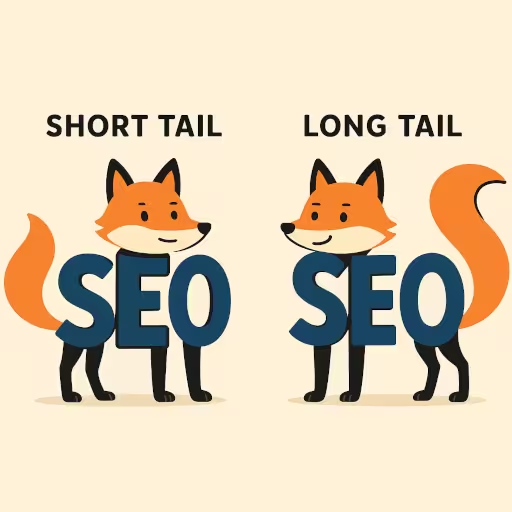Long Tail vs Short Tail Keywords: What They Are and Why They Matter for SEO
If you're new to SEO, you've probably heard terms like "long tail keywords" and "short tail keywords", but what do they actually mean, and why do they matter for getting your website seen in search results? Understanding the difference is essential for anyone who wants to attract the right visitors, compete in Google rankings, and build a sustainable stream of qualified traffic. In this guide, we'll break down the basics and show you how smart keyword choices, whether "long" or "short", can make or break your SEO efforts.
What Are SEO Keywords?
Keywords are simply the words or phrases people type into search engines (like Google) when looking for something.
SEO (Search Engine Optimization) is all about getting your website or page to show up high in the results when people search for those keywords.
- Example: If you run a website about guitars, keywords might be "guitar lessons," "best electric guitars," or "how to change guitar strings. Your site "ranks" well when it shows up near the top for those searches.
Short Tail Keywords
"Short-tail queries" are search terms that are very short, broad, and commonly searched, usually made up of just one or two words.
The term refers to the "head" of the keyword demand curve—the small number of big, popular keywords that attract huge search volumes.
Short tail keywords (also called "head" keywords) are very general and usually 1-2 words.
Examples of Short Tail Keywords:
- "Shoes"
- "Laptops"
- "Marketing"
- "Pizza"
Key Traits:
- Very broad. You have no idea what kind of shoes someone wants—running shoes, boots, dress shoes, etc.
- High search volume. Tons of people type these into Google.
- High competition. Everybody and their grandma wants to rank for "shoes," so every shoe company and big brand is fighting for those top spots.
- Low conversion rate. Because they're so general, people searching for "shoes" may just be browsing, not ready to buy.
Characteristics of Short Tail Keywords:
- Usually 1—2 words, rarely phrased as a question.
- Extremely high search volume, but also very high competition.
- Difficult to rank for unless you have an authoritative or established site.
- Lower intent—searchers may just be browsing or looking for broad information, not ready to take action.
Short Tail Keywords Analogy:
Short tail keywords are like standing in Times Square and shouting "pizza!"—sure, a lot of people will hear you, but you're competing with every pizza place in the city.
Long Tail Keywords
"Long-tail queries" are search terms that are longer, more specific, and less commonly searched than broad, generic keywords.
The term comes from the "long tail" of the keyword demand curve—after the big, popular terms (the "head"), there's a long "tail" of millions of uncommon, highly specific phrases that each get a small number of searches.
Long tail keywords are longer, more specific phrases—usually 3+ words.
Examples of Long Tail Keywords:
- "Best running shoes for flat feet 2025"
- "How to repair laptop battery at home"
- "Affordable vegan pizza delivery in Brooklyn"
- "Online marketing tips for small art businesses"
Key Traits:
- Very specific. You know exactly what the searcher wants.
- Lower search volume. Fewer people search for each long tail keyword.
- Low competition. Fewer websites are trying to rank for that exact phrase, so it's easier to show up higher in the results.
- Higher conversion rate. People searching with long, specific phrases usually know what they want and are closer to making a decision (buying, signing up, etc.).
Characteristics of Long Tail Keywords:
- Usually 3+ words, often a question or exact problem.
- Lower individual search volume, but combined, the long tail makes up most Google searches.
- Much easier to rank for, since there's less competition.
- Often higher intent—searchers are closer to taking action ("download", "compare", "best tool for...").
Long Tail Keywords Analogy:
Long tail keywords are like standing outside a running shoe store and asking, "Who's looking for size 11 running shoes for flat feet?"—fewer people hear you, but those who do are more likely to buy.
Why Long Tail Keywords Matter (Especially for Niche Topics)
- Easier to rank for. You're not fighting giant, established websites for visibility.
- More qualified traffic. The people who find your site via a long tail keyword are more likely to be interested in your specific product, content, or service.
- Great for niche topics. If you have a website about something not many people write about ("best Italian cookbooks for beginners" instead of just "cookbooks"), you can dominate those search results.
Real Example:
If you create a website with articles like "How to fix a rattling sound in 2014 Ford Focus at low speed," you'll have almost no competition, and the few people who land on your article are exactly who you want.
How Do People Use Keywords for SEO?
1. Research: Use tools (like Google Keyword Planner, SEMrush, Ahrefs, or free ones like Ubersuggest or Answer the Public) to find what people are searching for, and how competitive each keyword is.
2. Target: Create content (blog posts, product pages, etc.) focused on those keywords, especially long tail ones if you're new or targeting a niche.
3. Optimize: Use the keyword naturally in the page title, headings, body text, and metadata—without spamming.
4. Get traffic: As you rank for more long tail keywords, you start getting more visitors, which helps your site grow authority, making it (eventually) easier to rank for slightly more competitive phrases.
Key Takeaways
- Short tail = broad, popular, competitive. Hard to rank for unless you're a big brand.
- Long tail = specific, less searched, less competitive, but more valuable traffic. Easier to rank for and convert visitors.
- Smart SEO, especially for new/small/niche sites, means focusing on lots of long tail keywords—the combined traffic from many specific searches can add up, and you'll face less competition.
SEO Keyword TL;DR:
Don't waste your time fighting to rank for "shoes" or "pizza" unless you have massive resources. Target specific, detailed phrases that real people are searching for—these are the long tail keywords that actually bring you qualified traffic.
Conclusion
Understanding the distinction between short tail and long tail keywords is critical for anyone serious about improving their website's SEO. While short tail keywords attract more traffic, they're fiercely competitive and often too broad to convert well. Long tail keywords, on the other hand, offer lower competition, greater specificity, and attract more qualified visitors—making them the smarter, more efficient route for most websites, especially new or niche ones. By focusing your SEO strategy on targeting long tail keywords, you can build steady, high-quality traffic and carve out a strong position in your chosen niche.












